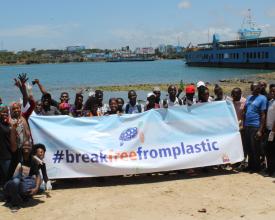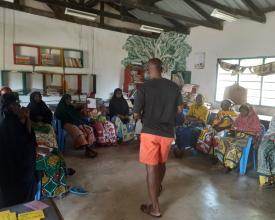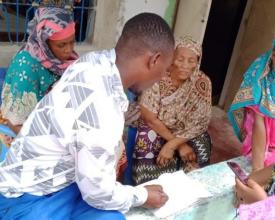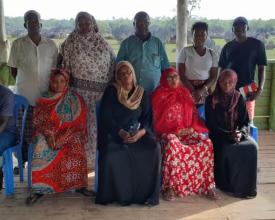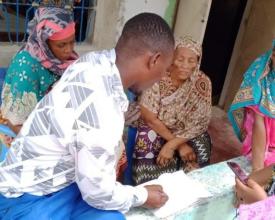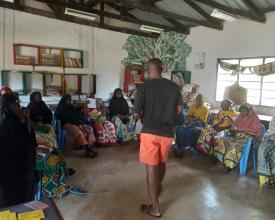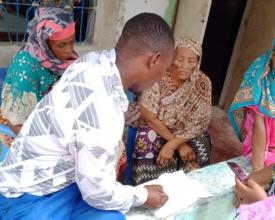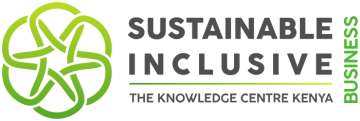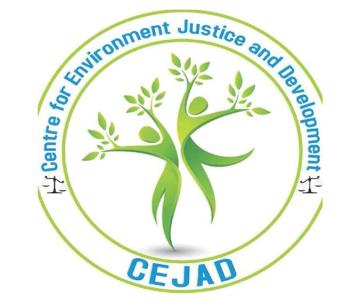
Intégration de la chaîne de valeur dans la gestion durable des déchets solides dans les comtés de Kwale et de Mombasa, au Kenya
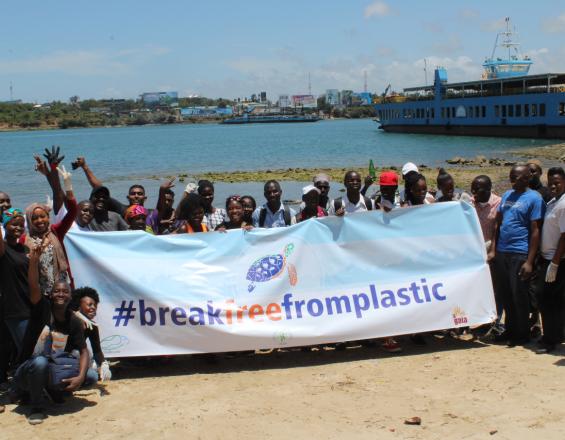
Le Centre pour la justice environnementale et le développement (CEJAD)vise à lutter contre la pollution par les plastiques et les déchets en promouvant la gestion durable des déchets par l'éducation du public sur les impacts des plastiques sur l'environnement et la démonstration des MTD/MPE telles que la séparation à la source des déchets, la réutilisation, le recyclage et la récupération ainsi que l'efficacité de la chaîne de valeur.
Le projet vise à mener les activités suivantes
- équiper les femmes artisanes de machines, d'outils et d'équipements pour réaliser des sculptures et des objets à partir de déchets plastiques.
- Former les femmes artisanes au développement de produits et à l'emballage.
- Mettre en place un système pilote de tri des déchets à la source et de gestion pour la récupération, la réutilisation et le recyclage des déchets plastiques et autres.
- Former les femmes artisanes à la commercialisation et au maintien des liens avec le marché.
- Entreprendre une étude de marché pour leurs produits.
Contexte
Défis à relever
- Nécessité d'incitations pour accélérer la collecte du plastique par les groupes communautaires. Les groupes communautaires ont évoqué le manque d'incitations à collecter le plastique, notamment en raison de la faible valeur de revente des déchets plastiques et du coût du transport des déchets plastiques vers une installation de recyclage.
- Le manque d'application de la séparation des déchets par les gouvernements des comtés. La gestion des déchets est une fonction de ce qui précède, mais le manque d'application de la loi entraîne la création de décharges et la pollution marine par le plastique.
- Les mouvements transfrontaliers de déchets constituent un autre défi, les déchets d'un comté étant déversés dans un autre pays en raison de l'absence d'installations de gestion des déchets et de la présence de collecteurs de déchets malhonnêtes.
- Connaissance insuffisante de la création de liens avec les recycleurs de plastique en raison de la perception biaisée des emplois associés à la gestion des déchets, à savoir un travail de pauvre, un paria social, etc.
- Capacité inadéquate des BMU à monétiser le plastique marin en raison des faibles volumes de déchets collectés.
Emplacement
Traiter
Résumé du processus
Avec le soutien financier du Fonds canadien d'initiative locale, le projet "Renforcer la capacité des femmes à relever le défi de la pollution marine grâce à un programme de tri et de recyclage des déchets à Mombasa" a été mis en œuvre avec succès.
La valeur des forums sert également de plateforme pour évaluer les différents besoins et lacunes à combler par les programmes de formation.
CEJAD utilise également ces plateformes pour rallier les membres afin d'aligner les ressources et d'investir dans la chaîne de valeur des déchets plastiques marins, garantissant ainsi le succès à l'avenir.
Blocs de construction
Forums multipartites
Le CEJAD s'est rendu compte que la valeur de l'engagement est essentielle pour amener divers acteurs ayant des besoins différents à s'aligner, ce qui permet de débloquer des ressources et de forger des alliances en vue d'un développement participatif significatif.
Des forums ont été organisés au sein de la communauté pour s'assurer que la participation du public est au cœur du problème des déchets plastiques marins et pour amener les groupes communautaires à s'approprier le problème et à le prendre en charge.
Facteurs favorables
- Alliance : L'établissement d'alliances a contribué à assurer la pérennité de la chaîne de valeur du plastique ainsi que le développement de plates-formes de commercialisation pour les déchets plastiques.
- Engagement des parties prenantes : la mise en place de plateformes et de forums est essentielle pour permettre aux différentes parties prenantes ayant des besoins différents de s'aligner et d'obtenir l'adhésion des partenaires, ce qui permet de débloquer des ressources et de forger des alliances en vue d'un développement participatif significatif. Des forums ont été organisés au sein de la communauté pour s'assurer que la participation du public est au cœur du développement.
Leçon apprise
- Une documentation appropriée doit être suivie avec des points d'action qui sont tous arrondis et approuvés par tous afin de renforcer la responsabilité.
- Amplifier et donner de la visibilité aux membres ayant un impact afin qu'ils puissent être des champions et des ambassadeurs de la gestion des déchets plastiques.
- Lier la formation à des sources de financement pour assurer la durabilité des entreprises et obtenir les résultats souhaités, ainsi que des mentorats continus et des séances de coaching, y compris des services bancaires de table.
- La coopération doit être au cœur de l'engagement pour faciliter les initiatives de gestion des déchets.
Formation et renforcement des capacités
Sensibilisation du public et formation des groupes communautaires de la vieille ville à la substitution des déchets plastiques, au recyclage, à la réduction, à la récupération et aux pratiques d'élimination sûres.
Équiper les femmes artisans de machines, d'outils et d'équipements pour réaliser des sculptures et des objets à partir de déchets plastiques, et les former au développement de produits et à l'emballage, tout cela s'est fait en connaissance de cause.
L'autonomisation n'est qu'un moyen de garantir l'intégration de la gestion des déchets plastiques.
Facteurs favorables
- Création d'entreprises : Ce facteur a été essentiel pour renforcer la durabilité tout au long du processus, notamment en mettant en relation les groupes communautaires avec des institutions financières afin d'améliorer leurs compétences en matière de gestion financière.
- Création d'un centre modèle sur le site d'atterrissage de Madubaa pour démontrer les meilleures pratiques en matière de zéro déchet, de 3R (réduction, recyclage et réutilisation), de présentation de produits et d'entreprises viables dans le domaine des déchets plastiques, de dépannage et d'apprentissage continu.
Leçon apprise
- Fournir des incitations pour catalyser la ségrégation des déchets à la source et la compléter par une sensibilisation à la promotion afin que les gouvernements des comtés assument leur rôle et leur fonction de mise en œuvre d'une gestion adéquate des déchets.
- Développer des programmes qui renforcent le changement de paradigme pour promouvoir la circularité parmi les parties prenantes d'une manière consultative, c'est-à-dire en les accompagnant tout au long du voyage, en organisant des sessions de co-création.
Impacts
- Sensibilisation et formation des groupes communautaires de la vieille ville à la substitution des déchets plastiques, au recyclage, à la réduction, à la récupération et aux pratiques d'élimination en toute sécurité.
- Création d'un centre modèle sur le site d'atterrissage de Madubaa pour démontrer les meilleures pratiques pour le zéro déchet, les 3R (réduction, recyclage et réutilisation), la présentation de produits et d'entreprises de déchets plastiques viables, le dépannage et l'apprentissage continu.
- Facilitation du dialogue entre le public et les parties prenantes sur l'intégration de la réduction et de la gestion des plastiques et des UPOP dans la politique, les plans, les budgets et les projets du gouvernement du comté.
Bénéficiaires
- Groupes de femmes
- Unités de gestion des plages (BMU)
- Hôtels touristiques
- Communautés locales
Objectifs de développement durable
Histoire
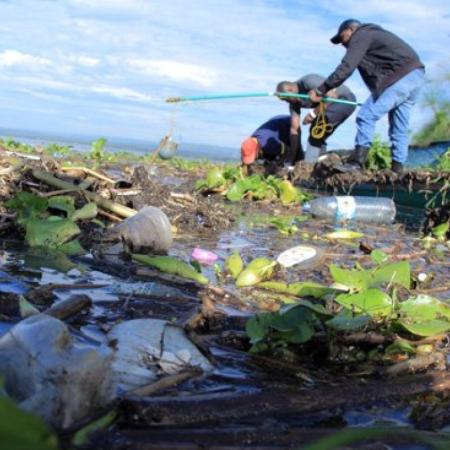
Dès notre plus jeune âge, nos parents nous ont inculqué une profonde appréciation et un grand amour de la nature en nous montrant l'exemple. Nous connaissions les noms des oiseaux et des arbres bien avant de pouvoir aligner des phrases correctes et nous avons passé une grande partie de nos vacances d'enfance dans des bassins rocheux à explorer et à faire de la plongée avec masque et tuba, qu'il pleuve ou qu'il vente. Nous avons pratiquement grandi sous une tente. Partager leur amour pour ces lieux sauvages au travers d'aventures à travers notre continent m'a aidé à comprendre que les bases sont suffisantes, qu'il est toujours possible d'élaborer un plan et que la nature est notre professeur le plus puissant. Ces vérités sont devenues le cadre sur lequel nous avons construit notre vie. Nous avons commencé en tant que bijoutier avec les outils de bijouterie de l'université qui consistaient principalement en une gamme de limes et de pinces. Nous avons économisé juste assez d'argent pour acheter un rouleau à métaux d'occasion. Aujourd'hui encore, ce sont ces outils qui racontent notre histoire. Nous ne voulions pas attendre d'avoir suffisamment d'argent pour ouvrir un atelier. Nous voulions commencer avec ce que nous avions là où nous étions. Lorsqu'il s'agit de nos rêves créatifs, le désir de commencer a toujours été plus grand que la peur d'échouer. Nous apprécions le défi que représentent des outils minimaux. Nous apprécions de ne pas avoir à nous fier à l'idée conventionnelle de ce à quoi les bijoux devraient ressembler lorsqu'une gamme complète d'équipements de bijouterie est en jeu. Les limites sont devenues une source d'inspiration et une force, tant sur le plan personnel que professionnel. Nous fabriquons des bijoux à partir de tout et n'importe quoi, en nous spécialisant dans les objets trouvés et les métaux alternatifs - le laiton que j'ai utilisé provenait de gars qui soudaient des radiateurs en bas de la rue ; mon cuivre venait d'un plombier qui passait par le studio en allant à la ferraille pour gagner de l'argent. C'était un mode de vie bien avant que je n'emménage sur l'île de Wasini. C'est ainsi que nous fabriquons des bijoux depuis que nous avons commencé. L'expansion de notre entreprise ne consiste pas à augmenter notre compte en banque ou le nombre de personnes que nous employons, l'expansion de notre entreprise signifie l'expansion de notre esprit. La collaboration est porteuse de pouvoir et la responsabilisation par la pensée créative est à l'origine du changement.
